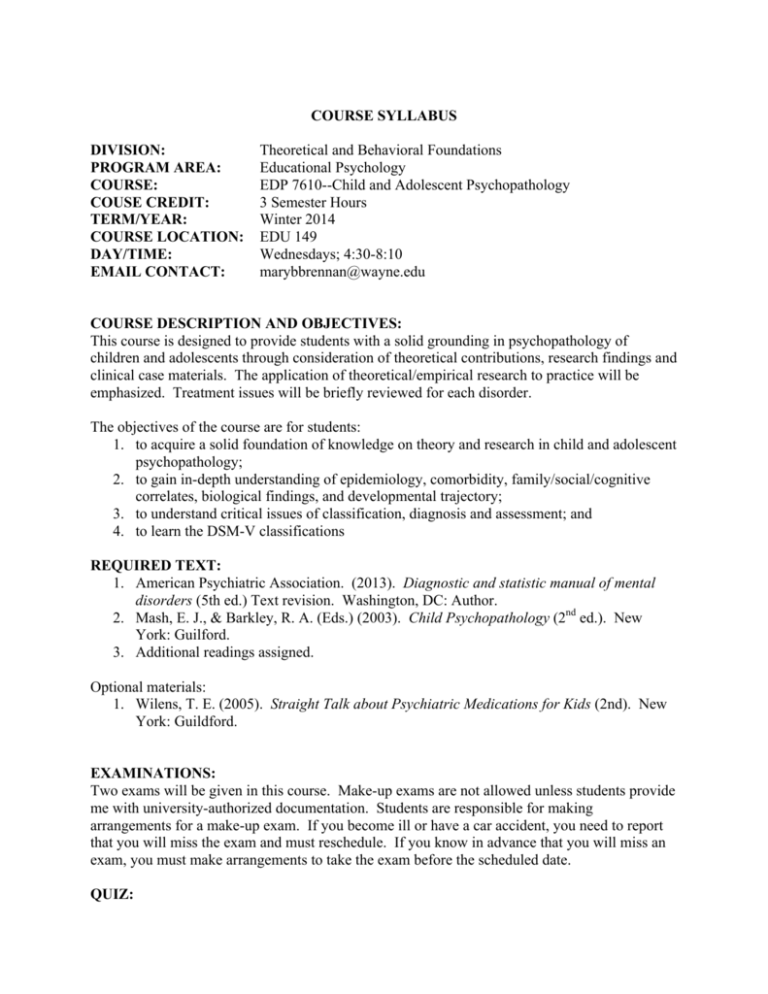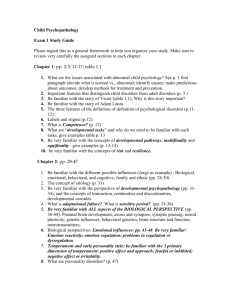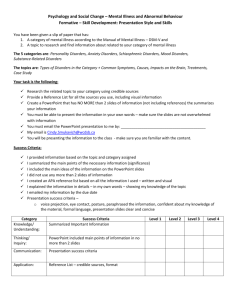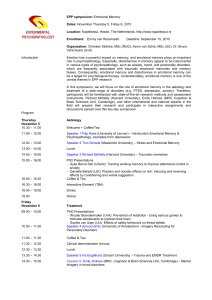EDP 7610 - Wayne State University
advertisement

COURSE SYLLABUS DIVISION: PROGRAM AREA: COURSE: COUSE CREDIT: TERM/YEAR: COURSE LOCATION: DAY/TIME: EMAIL CONTACT: Theoretical and Behavioral Foundations Educational Psychology EDP 7610--Child and Adolescent Psychopathology 3 Semester Hours Winter 2014 EDU 149 Wednesdays; 4:30-8:10 marybbrennan@wayne.edu COURSE DESCRIPTION AND OBJECTIVES: This course is designed to provide students with a solid grounding in psychopathology of children and adolescents through consideration of theoretical contributions, research findings and clinical case materials. The application of theoretical/empirical research to practice will be emphasized. Treatment issues will be briefly reviewed for each disorder. The objectives of the course are for students: 1. to acquire a solid foundation of knowledge on theory and research in child and adolescent psychopathology; 2. to gain in-depth understanding of epidemiology, comorbidity, family/social/cognitive correlates, biological findings, and developmental trajectory; 3. to understand critical issues of classification, diagnosis and assessment; and 4. to learn the DSM-V classifications REQUIRED TEXT: 1. American Psychiatric Association. (2013). Diagnostic and statistic manual of mental disorders (5th ed.) Text revision. Washington, DC: Author. 2. Mash, E. J., & Barkley, R. A. (Eds.) (2003). Child Psychopathology (2nd ed.). New York: Guilford. 3. Additional readings assigned. Optional materials: 1. Wilens, T. E. (2005). Straight Talk about Psychiatric Medications for Kids (2nd). New York: Guildford. EXAMINATIONS: Two exams will be given in this course. Make-up exams are not allowed unless students provide me with university-authorized documentation. Students are responsible for making arrangements for a make-up exam. If you become ill or have a car accident, you need to report that you will miss the exam and must reschedule. If you know in advance that you will miss an exam, you must make arrangements to take the exam before the scheduled date. QUIZ: 2 There will be 10 quizzes throughout the course. On the tentative schedule, you will find topics in bold and quiz number/s. Each week the class will start with a quiz, followed by self-grading and class discussion. The purpose of these quizzes is to familiarize you with the DSM-IV criteria for major psychological disorders of children and adolescents. POSITION PAPER: In this course, you will learn a number of psychological disorders with respect to diagnostic criteria, etiology, prevalence, etc. The first chapter of the Mash and Barkley book presents a comprehensive discussion of developmental psychopathology. Students are required to write a 7-8 page position paper that addresses the following questions: What is your understanding of developmental psychopathology? What are some critical issues to be considered in understanding a childhood disorder based on a framework of developmental psychopathology? Why do children develop certain disorders? What will be your future orientation in assessing and treating children and adolescents? DO NOT use these questions as the headings of your paper. Instead, develop an integrated statement of your perspectives and orientations. It is important to articulate how these perspectives and orientations guide the way you evaluate and treat children and adolescents. The paper should be a product of your reflective process after a semester long learning of different disorders. This paper will be evaluated based on: Full consideration of critical issues in developmental psychopathology (30 points) Good understanding of etiological underpinning and theoretical perspectives (30 points) Good articulation of future orientation in assessment and treatment (30 points) Appearance, format, writing and grammar (10 points) Miscellaneous paper specifications: Papers must be typed and double-spaced with reasonable margins, e.g., 1 inch on left and right. Use a reasonably sized font. For example, 12-point Times New Roman looks most professional. Assign a title to your paper and place it at the top of the first page with your name in the upper right corner. Do not use a cover sheet or plastic covers. Staple the upper left corner. PRACTICUM ASSIGNMENTS: Students are required to obtain practicum experiences in a self-contained EI classroom and a selfcontained ASD classroom. In many districts, the EI and ASD students are integrated in general education classroom settings throughout the day or EI and ASD students participate together in a self-contained resource classroom. These types of placements need to be approved prior to your observation days. Students should make their own contacts with schools and locate their own placements. Please contact the instructor if there is a problem locating a placement. In each classroom, students need to spend one full day (6-7 hours) or two half days and learn about student characteristics, instructional processes and classroom ecology (physical, psychological and social climate). Students are expected to participate in each classroom, functioning as paraprofessionals and get directly involved in working with students. A three page report from each classroom is required. The report should include what students observed in terms of behaviors, learning patterns, 3 class routines, physical and social environment, teachers’ methods of instruction, behavior management, etc. Please submit your reports by 4:30pm on February 26. FINAL GRADES: Your final grade will be calculated out of a possible 400 points: Exam 1 100 Exam 2 100 Position paper 100 Quizzes 50 (5 points/quiz) Practicum reports 50 (25 points/report) ______________________________________ Total 400 The following grading scale will be applied: A AB+ B B- 93+ 90-92 87-79 83-86 80-82 C+ C CE 77-79 73-76 70-72 <69 ATTENDANCE: Students are expected to attend class and to complete all assignments. Some materials presented in class will not always be covered in the textbook. Students are responsible for obtaining missed information including announcements and changes in class schedule. PROFESSIONAL BEHAVIOR: Students are expected to maintain good conduct in six areas of professional work behavior. You will be evaluated on these areas in this course. These skills (listed below) are critical to the development of successful psychology practitioners, and problems in these areas will require intervention by the instructor and/or the program directors. 1. 2. 3. 4. 5. 6. Respect for human diversity Communication skills Effective interpersonal relations Ethical responsibility Adaptability Initiative and dependability CELL PHONE POLICY: Cell phones should only be out during class if you have an emergency situation. Phones need to be on ‘silent’ mode during the entire class period. 4 ACADEMIC DISHONESTY: No form of academic dishonesty will be tolerated. You are in this class to learn, and you must commit the effort to obtaining your own knowledge and skills. You should already be aware, but for specific examples of academic dishonesty, including what constitutes plagiarism, you should read the Undergraduate and Undergraduate Bulletins found at http://www.bulletins.wayne.edu/, The Student Due Process Policy at http://students.slis.wayne.edu/policies/index.php and any other formal documents that are created for students at WSU found through www.wayne.edu. You will be asked to sign a "denial of academic dishonesty/pledge of authenticity" statement and attach it to each product turned in for credit in this class. Any academic dishonesty will clearly be considered premeditated and not accidental. Expulsion is probably not worth the few hours of work you will avoid by cheating, so please think carefully and thoroughly, ask for help when needed, and make smart decisions. WSU Plagiarism Policy: Plagiarism includes copying material (more than 5 consecutive words) from outside texts or presenting outside information as if it were your own or by not crediting authors through citations. (APA cites require author, year, and page number for direct quotes in quotation marks and for paraphrases with no quotation marks.) It can be deliberate or unintended. If in doubt about the use of a source, cite it. University policy states that students can be subject to multiple sanctions, from reprimand to expulsion as a consequence of academic dishonesty. Students caught plagiarizing information from other sources will receive a failing grade in the course. To enforce this policy, all outside references must be submitted with assignments. [Check out web resources related to plagiarism to learn more. For instance a good plagiarism definition can be found at: http://www.suite101.com/content/a-definition-forplagiarism-a10232; and paraphrasing examples good and bad at http://library.csusm.edu/plagiarism/howtoavoid/how_avoid_paraphrase.htm. RELIGIOUS OBSERVANCE POLICY: Because of the extraordinary variety of religious affiliations represented in the University student body and staff, the Wayne State University calendar makes no provisions for religious holidays. It is University policy, however, to respect the faith and religious obligations of the individual students who find that their classes or examinations involve conflicts with their religious observances. They are expected to notify their instructors well in advance so that alternative arrangements as suitable as possible may be worked out. STUDENT DISABILITY SERVICES: If you have a documented disability that requires accommodations, you will need to register with Student Disability Services (SDS) for coordination of your academic accommodations. The Student Disability Services (SDS) office is located at 1600 David Adamany Undergraduate Library in the Student Academic Success Services department. SDS telephone number is 313577-1851 or 313-577-3365 (TDD only). Student Disability Services’ mission is to assist the university in creating an accessible community where students with disabilities have an equal opportunity to fully participate in their educational experience at Wayne State University. 5 WITHDRAWAL DEADLINE: Withdrawal Policy: Students who withdraw from a course after the end of the 4th week of class will receive a grade of WP, WF, or WN. WP will be awarded if the student is passing the course (based on work due to date) at the time the withdrawal is requested - WF will be awarded if the student is failing the course (based on work due to date) at the time the withdrawal is requested - WN will be awarded if no materials have been submitted, and so there is no basis for a grade Students must submit their withdrawal request on-line through Pipeline. The faculty member must approve the withdrawal request before it becomes final, and students should continue to attend class until they receive notification via email that withdrawal has been approved. Withdrawals can be requested at any point from the firth week of class through the end of the 10th week of classes. - Students are sent two communications each semester regarding course withdrawals and deadlines for withdrawing. The medical withdrawal process can be initiated for up to three months following the end of a term, and is not impacted by this change in withdrawal deadline. Exceptions for other reasons would be considered only when circumstances beyond a student’s control affect ability to complete course requirements, and occur after the end of the withdrawal period and prior to the beginning of the final examination period. In no case will a late withdrawal be approved after a student has taken the final exam, or received a final grade in the class. 6 TENATIVE SCHEDULE: (Note: this schedule is subject to change) Jan. 8: Introduction: Approaches to the classification and diagnosis of psychopathology. Jan. 15: Theories in Developmental Psychopathology (1) CP Chapter 1 (2) Friedman, R. J. Psycho-educational diagnosis (3) DSM-V pps. 12-17 and 19-25 (4) Hudziac, J. et al. (2007) Dimensional Approach to Developemntal Psychopathology Jan. 22: Contexts of Psychopathology (1) Fiese, Wilder & Bickham (2000). Family context (2) Roeser & Eccles (2000). Schooling and mental health (3) Coll & Garride (2000). Sociocultural context (4) Rudolph & Ahser (2000). Peer system Jan. 29: Individual Characteristics: Biological influences and Childhood Schizophrenia (quiz 1) (1) DSM V p. 99-105, p.265-268, p. 286-289 (2) CP Chapter 10 (3) Fowles (2003) Biological Variables in Psychopathology Feb. 5: Childhood Depressive Disorders (quiz 2) (1) DSM-V (2) CP Chapter 5 Feb 12: Childhood Anxiety Disorders (quiz 3) (1) DSM-V (2) CP Chapter 6 Feb 19: Attention Deficit Hyperactivity Disorder (quiz 4) (1) DSM-V (2) CP Ch. 2 (3) OHI MET form and 504 document (on Blackboard) Feb 26: Review Class (1) Review material in preparation for first exam (2) Case (3) Practicum Reports are due March 5: Test 1 March 12: NO CLASS Spring Break 7 March 19: Disruptive, Impulse-Control Disorders and Conduct Disorder (quiz 5 & 6) (1) DSM-V (2) CP Ch. 3 (3) Social maladjustment definition (Wayne RESA documents on Blackboard) March 26: Substance-Related Disorders & Learning Disorders (quiz 7) (1) DSM-V (2) CP Ch. 4 and 12 (3) NASP Position Reading (on Blackboard) (4) Oakland County MET forms for SLD (on Blackboard) April 2: Intellectual Disabilities & Autism Spectrum Disorder (quiz 8) (1) DSM-V (2) CP Ch. 11 and 9 (3) CI MET form (on Blackboard) April 9: Trauma- and Stressor-Related Disorders (Adjustment Disorder, Acute Stress, PTSD) and Personality Disorders (quiz 9) (1) DSM-V (2) CP Ch. 7 & 14 (3) Borderline features among adolescents (Handout) April 16: Disorders with Physical Manifestations (quiz 10) Eating disorders, Tic disorders, Elimination disorders, Sleep disorders, Somatoform disorders (1) DSM -V (2) CP Ch. 15 and 16 (3) Position Paper is due April 23: Test 2







